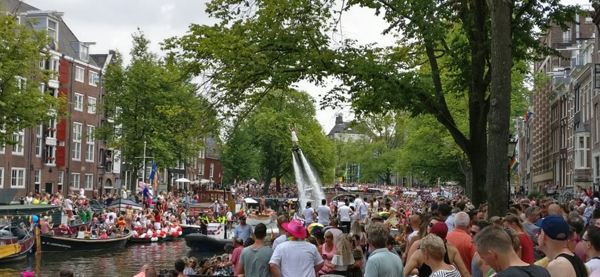A blog about (hidden) Amsterdam
A blog about (hidden) Amsterdam
2021 was the 25th anniversary of the renowned Pride Parade through Amsterdam’s canals. But why does Amsterdam, whose mayor performed the world’s first legal gay marriage in April of 2001, celebrate in August when everyone else celebrates on the last Sunday in June? Unsurprisingly, it’s all about history.
The Stonewall Uprising – which began in the early hours of Sunday, June 28, 1969 – was a turning point in the modern gay rights movement. Led by trans women of color, LGBTQ+ people in New York City fought back against police harassment and inspired LGBTQ+ people around the globe to fight to be treated like human beings. In the years that followed, LGBTQ+ communities worldwide arranged marches on the anniversary of Stonewall, which established the tradition of celebrating LGBTQ+ Pride during the last week in June.

In the Netherlands, LGBTQ+ rights groups turned this into a deeply local day of action, Roze Zaterdag (Pink Saturday). It took place in a different Dutch city each year and consisted of events aimed at changing the political landscape and confronting each city with the humanity of LGBTQ+ Dutchies. It was part of the successful campaign to bring about political change by making it feel like LGBTQ+ people were part of mainstream Dutch society. It meant, however, that the Netherlands had a weekend of political action, not one of celebration.
Enter the Gay Games. In 1998, LGBTQ+ athletes and celebrants from around the world flocked to Amsterdam for the Gay Games. To energize the city and lay the social groundwork for the Gay Games, organizers created a boat parade through the canal belt in 1996 and 1997. The Games created so much energy and joy that the organizers decided to carry the spirit forward with a boat parade the following year. And thus, Amsterdam’s annual August Pride Parade was born.
And hey, why not hear some more incredible stories on our LGBTQ+ History Tour?
Check out some more Blamsterdam! posts.
Private Museum Tour
See the highlights and hidden icons of Amsterdam’s world-renowned Rijksmuseum in a private guided tour that explores who creates art and what stories it’s used to tell. And don’t worry about museum tickets. We’ve got you covered.


Small-Group Walking Tour
This historical tour through the busy Jewish quarter and residential Plantage neighborhood offers a selection of stories from BIPOC, LGBTQ+, Jewish and women’s history. It’s the perfect way to get an alternative view of Amsterdam.


Self-Guided Digital Tour
Use your phone to explore Amsterdam! This self-guided tour uses audio, images, maps, and text to introduce you to the women, BIPOC, LGBTQ+, and Jewish people who made Amsterdam what it is.


Small-Group Walking Tour
In 1593, Jewish Amsterdammers began building a community in the relative safety of the city that transformed both the Netherlands and the world. Learn about these creative, compassionate, and challenging mavericks and their impact.


Small-Group Walking Tour
The women who shaped Amsterdam are more complex than traditional tours would have you believe. Go to Amsterdam’s historic sites to hear stories of women who fought, wrote, calculated and led through the city’s chaotic and complicated past.


Small-Group Walking Tour
The world’s first gay marriage was officiated by the Mayor of Amsterdam at its City Hall. But did you know that the city’s LGBTQ+ history stretches centuries? Meet historical Amsterdammers across the gender spectrum and sexual orientations.


Private Walking Tour
Get a personalized tour that covers the interests you’re curious about and the neighborhoods you want to see. Choose pick-up/drop-off locations, any combination of our hidden history topics, and themes such as artists, politicians, and rebels.

